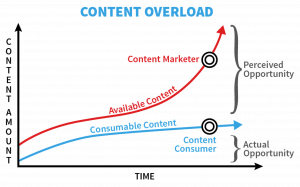
Content marketing messages with too much “me” are doomed to fail
Too many content marketers approach their marketing message from the wrong viewpoint – their own, rather than their customers’ viewpoint.
That’s a huge mistake.
If you focus your message on “me,” you talk all about your company, your products and yourself. And your customers are left thinking, “Who cares?”
It’s a flawed approach to creating your marketing message.
It’s hard enough to capture customers’ attention in the age of content overload. You may have only 7 seconds, in a world where attention spans are as short as 8 seconds.

Don’t put customers off by making your message all about “me.”
So many companies start off their websites and their corporate presentations on the wrong foot. It’s all about:
• How your company is the industry leader
• How long your company’s been in business
• How your company has the most innovative products
• How your company is different from everyone else
• How your company has the best customer service.
The problem with a message that talks about yourself is: Your customers don’t care about you. What they really care about is themselves, their questions, their worries, their problems.
In content marketing, a self-centered message sends buyers back to Google or off to your competitors’ website – so you lose potential readers and customers. Bragging offers them nothing. A self-centered message turns people off quickly, and the science shows it.
Bragging doesn’t work – online or in real life. Researchers from City University London, Carnegie Mellon University and Bocconi University studied the effect of bragging on the audience. Here’s what they found:
“Most people probably realize that they experience emotions other than pure joy when they are on the receiving end of someone else’s self-promotion,” said Irene Scopelliti, the study’s lead author and a lecturer in marketing at City University London, who conducted the research while a postdoctoral fellow at Carnegie Mellon. “Yet, when we engage in self-promotion ourselves, we tend to overestimate others’ positive reactions and underestimate their negative ones.
“These results are particularly important in the Internet age, when opportunities for self-promotion have proliferated via social networking. The effects may be exacerbated by the additional distance between people sharing information and their recipient, which can both reduce the empathy of the self-promoter and decrease the sharing of pleasure by the recipient,” she said. Here’s more on that study.
This study is spot on. Begin your marketing with empathy. Understand that customers care most about themselves, just as you do.
Take the time to see the world through the eyes of your customers. To cut through, your message must adopt your customers’ viewpoint. As you do, your message will grow more and more appealing to them.
To craft an appealing message, talk about what customers care about. One question is always on customers’ minds, “What’s in it for me?” (WIIFM?)
How will your customers and their companies benefit from using your product or service? Will it:
• Increase revenues?
• Lower expenses?
• Deliver a better customer experience?
How will the buyer benefit personally and professionally from using your product or service? How will you turn your customer into a hero whose career can advance as a result of making the good decision to buy from you?
Take the right approach to your marketing message. Help customers before you sell. Never waste your breath on bragging.
Answer your customers’ most important questions. Describe how your solution directly addresses your customers’ problems – and how they benefit, how both they and their company win.
If you don’t know your customers’ most important questions, ask sales and service people to share customers’ questions from memory. Make good notes.
Then ask your sales and service people for a favor: ask them to write down all the questions they hear from customers, in the customers’ exact words, for the next month. Analyze and tag these questions so that you customers’ day-to-day concerns.
Now you’re on the road to content marketing nirvana. Capturing customers’ questions, and writing expert answers, will provide you with an abundant cornucopia of content.
Use customer questions and answers in your blog, your website, and your social media – and you’ll have relevant material for months to come. Your customers are guaranteed to be interested in it, because it’s all about them and what they need.
Customer-first content gives you a solid foundation for your marketing message. Customers want to read it, because it’s all about your them and not all about you.
Too many websites, especially those of technology companies, start out with empty bragging and boasting. How many sites have you found that start out: “We are at the market leader in innovative widgets, with three decades of experience.”
Yawn.
Excuse me, but if you were really the market leader, your customers would already know that. So you wouldn’t have to state it in the first paragraph of your website. Are you really the leader? Or #5 in the market? Don’t turn off customers by exaggerating.
If your widget is really that innovative, ok, then say how your innovations actually benefit customers:
• Are your products easier, cheaper, or faster to install?
• Are your products longer-lasting because of high-quality design and materials?
• Are your products lower in price?
• Do your products make your customers’ customers happier?
That’s what your marketing message should really be about.
As a consumer, you’ve already seen too many brag-and-boast ads on TV. Perhaps your local car dealer talks about himself and his dealership for an unendingly, unbearably long 30 seconds.
If he talks about himself instead of talking about why this car is right for you, chances are you’ve laughed at him, skipped his ad or tuned him out.
Decades ago, self-centered “brag and boast” advertising ran rampant, especially in business to business (B2B) marketing. It was roundly criticized by the Copy Chasers, ad critics who held up bad examples of brag-and-boast advertising to the ridicule they so roundly deserved.
Sadly, no one does that job anymore. After reviewing a few B2B technology websites, you may conclude that the marketing world seems forgotten the Copy Chasers lessons.
It’s still far too easy to find a website that never says the word “customer,” and never talks to “you.” Ouch. If your existing marketing message is really all about your company and products, it’s time for a new message.
Take the “me” out of your message and put your customer into it. Make your customers into the heroes that they really are.
Look at your marketing story in the way Joseph Campbell looked at stories from mythology. You’ll see that your company’s role is not the hero, it’s the mentor.
That’s because you provide customers the tools with which they change the world. In Star Wars parlance, you are Yoda, not Luke. In Biblical terms, you play Yahweh, not Moses.
You’re the mentor who enables your customer heroes to succeed. Tell the story that way and it becomes much more effective in reaching your customers.
Thrust your customers into the spotlight, where they belong. In your marketing message, make it all about your customers’ success, not your own.
See the world through your customer’s eyes, and it rapidly becomes clear who the real heroes are: your customers.
If you need help with your marketing message, our Message Map workshops help you create powerful messages. A 1-page Message Map will simplify, clarify and amplify your message so you can capture customers’ attention quickly.
Related Posts
Be buyers’ guide: connect the dots clearly
When you use a Message Map, it’s easier to become your buyers’ guide. A Message Map performs several critical jobs for marketers – and for...
Why your company needs media training
A reporter calls asking for a quote for a story about your industry. If you don’t respond by the reporter’s deadline, your competitors will...
How Do Content Marketers Measure Meaningful Web Traffic? And Get the Credit?
At Content Marketing World, I invited content marketers to ask questions about How to Speed the Journey from Content to Cash. One great question...
Top 100 Content Marketing Question: How do you promote content / preferred method?
To promote content, distribute it 3 ways: 1. Owned media Put most of your work into creating great content you can own such as...





